|
|
Little more than half of PBS
affiliates around the United States, and only two of the top ten markets,
aired (on April 17, 2006) the follow-up panel discussion to the propaganda
film, "The Armenian Genocide"... covered extensively at TAT.
"Armenian Genocide: Exploring the Issues" was PBS's half-hearted
attempt at "equal time," which PBS wholeheartedly sabotaged with its
announcement that PBS "acknowledges and accepts the genocide."
Add a full-fledged campaign of Armenian extremists and their political allies
to boycott the show, and the rug was effectively pulled out from under this
debate. Perhaps it wasn't a bad thing, as the PBS producers (one being Oregon
Public Broadcasting's David Davis, an Armenophile who let the propagandists
get away with every claim for the film; he co-produced this panel discussion,
as well) did their best to make the debate an extension of their propaganda.
As PBS Ombudsman Michael Getler phrased it in his April 21, 2006 column,
regarding one-half the "Turkish" team: "Turan, with halting
English in the company of three fast-talking and articulate other panelists,
made little, if any impact." It boiled down to "two against
one," as Getler further wrote, and the two from the
"Armenian" side happened to be among the most unethical the Armenian
genocide industry has to offer. Add to this mix a pro-genocide moderator who
made no bones about where his prejudices lay, and this sorry
"debate" basically boiled down to three against one. Despite
the odds, at least some truths leaked through, and those who were unable to
watch it at least will have the chance to study the transcript of the program.
An analysis follows of, first, The Host, and next, The Program, referencing the points of the transcript through
footnotes.
|
|
|
| |
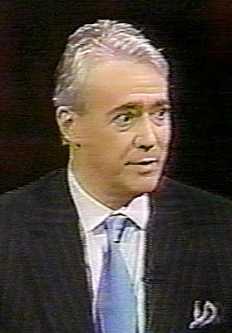 |
|
Scott Simon |
SIMON: Hello. I'm Scott Simon. Thank you for joining
us. You've just seen a program describing events that occurred during the collapse of the
Ottoman Empire during World War I. For the next half hour, we are going to discuss some of
the issues that were raised in this documentary, and we are joined by four guests. Justin
McCarthy is a professor of history at the University of Louisville, Taner Akcam, who
appeared on the program, is a Turkish sociologist and historian [1], is currently a visiting professor at the University of Minnesota. [2] Ömer Turan is an associate professor of history at
the Middle East Technical University, in Ankara, Turkey; and Peter Balakian, who also
appeared in the program, is a poet and a {?}, and a professor of Humanities at the Colgate
University.
Gentlemen, thanks all very much for being with us. I want to turn to you first, Professor
McCarthy, because I know you have a different viewpoint than some of what we have seen in
the film. I have to begin by saying it's impossible not to see this very powerful film,
pictures of the killing fields, the cattle cars, the very vivid descriptions of people who
saw firsthand what happened, and not to conclude that what the world saw was an
extinction, a genocide of the Armenian people. [3]
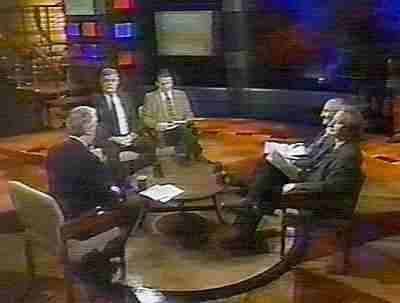
McCARTHY: Well, I think that proves that the propagandists {?} work very well. Because
this is really propaganda masquerading as history. It is true that the Armenians suffered
terribly. The difficulty is, by only presenting half of a story, by only showing you the
Armenian dead, they make it appear like a genocide. The Armenians did suffer terribly; but
the Muslims, the Turks and the Kurds, they suffered equally as badly. And by skipping
that, their not putting that in, they made what was actually closer to a civil war, or
perhaps a mutual genocide [4], appear like a slaughter
by of one group by another. This movie, unfortunately, is {?} historically, extremely
inaccurate. Not simply about Armenians....
SIMON: Can you point out a couple of specific inaccuracies in your {?}
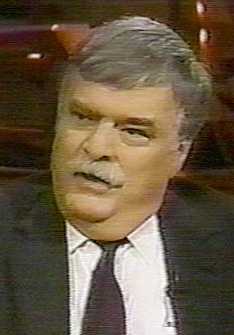 |
|
Justin
McCarthy |
McCARTHY: Well, pick something that has nothing to do
with this issue, for instance; they talk about the Balkan Wars, which were fought in
1912-1913. They misidentified the countries. They say that Rumania fought against the
Ottomans, which it didn't. They imply that Greece and Serbia and Rumania and these places
didn't exist until then, when they took themselves free of the Ottoman Empire...
SIMON: What about some inaccuracies in regards to the Armenian Genocide?
McCARTHY: The biggest inaccuracy is the crime of omission, to me. For instance, they don't
mention that the beginning of what's called the Armenian Genocide was revolt by Armenians,
especially in the province of Van, that began when mobilization took place even before the
war took place — began almost a year before the events of any deportations — and which
had an attendant upon it, a tremendous slaughter of Muslim civilians. Now, this was the
first thing that happened. I don't think it's terribly important what happened first,
because this is an inhuman time for everyone. But to not mention what happened to the
Armenians happened primarily out of revenge, for things that Armenians did, is simply to
falsify history tremendously. It's like taking the American Civil War and saying it's a
genocide of the south, because you don't mention that the northern people died as well.
SIMON: Why don't we... Peter Balakian.
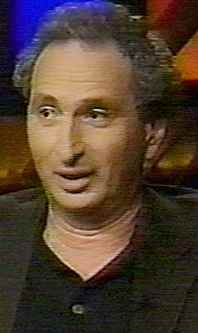 |
|
Peter
Balakian |
BALAKIAN: Well [ahem], I think what we've heard from
Mr. McCarthy is a fantasy, and I think it's important to say that Mr. McCarthy and Mr.
Turan have worked for the Turkish government, to help that government deny the Armenian
genocide; and I think it's important for our viewers to understand that the Turkish
government has had an egregious human rights record against intellectuals, against
intellectual freedom, it has made the Armenian genocide taboo and illegal, in its own
country, and to be working with that kind of project is already to make it clear what kind
of propaganda you are engaged in. What I think this documentary shows so brilliantly is
the mainstream, international scholarly discourse that is imbedded in the Armenian
genocide discourse. For the first time, we see terrific Turkish scholars like Taner Akcam,
Muge Gocek, Mr. Berktay, Mr. Adanir, talk self-critically about their past. What the
Turkish government has outlawed is self-critical analysis of its past, and unfortunately,
these gentlemen are part of that project, and I think that tells you a great deal. There
is no propaganda about the Armenian genocide outside of Turkey. Turkey is where the
genocide is generated, and it's part of a nationalist project. Let me also say what I
think is so powerful about this film. We see Raphael Lemkin on national television in
1949, the man who invented the concept of genocide talking about genocide — using the
term Armenian genocide publicly in a very early moment in the morphology of that concept,
and that's very powerful, because the Armenian case was part of Raphael Lemkin's
understanding of what genocide was. [5]
SIMON: Let me turn to Ömer Turan if I could; what do you make of these very vivid
firsthand accounts that appeared in newspapers, that were sent back to embassies, ah,
missionaries, people who saw firsthand what was happening, and the word
"genocide" wasn't commonly used, but they certainly referred to as a slaughter,
and as a massacre, that was deliberately intended to extinguish the Armenian people.[6]
TURAN: I worked in that missionary archives, and I also worked in the archives of Admiral
Bristol, who was the High Commissioner of the United States in Istanbul. And in his
report, Admiral Bristol says that I know that there is a strong propaganda being carried
out in the United States in favor of the Greeks and Armenians, and I have read articles in
which I know they contain great inaccuratacies, if not {?}. I can give...
SIMON: (I believe) inaccuracies is the word..?
TURAN: Yes. I can give some more...ahh... examples from what Admiral Bristol... ahh...
said about propaganda work, ahh, in the United States.
SIMON: Well, I'm obviously not familiar with that, but it seems to me that to take one out
of a morass of firsthand accounts and to have somebody refer to that as some inaccuracies
or {representatives} is different than impeaching the firsthand accounts of the people who
were there, and saw what happened. What explanation is there for that?[7]
TURAN: Those informations, informations, let me call, was given, was sent to the United
States from the same sources; in one of others ahh, record, Admiral Bristol says that he
discussed in one of his interviews with Bishop Darlington, and, ahh, he speaks, Bishop
Darlington speaks about two million deaths of the Armenians, and, ahh, he says, ahh, it's
written in all, ahh, {serious} American, French, British newspapers, and Admiral Bristol
say that, well, it's written in all those newspapers, but their sources are the same. From
one source...
SIMON: I'm not sure I follow that, but you wouldn't dispute that there were hundreds of
thousands or millions of deaths, would you?[7b]
TURAN: No, ahh...
SIMON: Even if the exact, even if the exact figure...
TURAN: Someone claims it, as Admiral Bristol says, that these claims, ahh, are coming from
the same source. In all these newspapers.
SIMON: Professor Akcam.
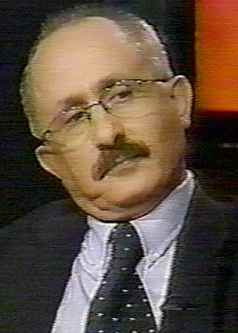 |
|
Taner Akcam |
AKCAM: {I mean...} not a necessary debate. There, I'm
working on the archives, and I know the archives materials. Generally, everyone should
know that. There is no inconsistency between American, German, British, and Ottoman, and
Austria-Hungary materials. All these archival materials, including the Ottoman materials,
gives a very clear picture of the genocidal intent of the authori, Ottoman authorities. To
pick up one document, and to explain all that, these are not, we are scholars, and we have
to be very careful, and we have to avoid making {weight} unsupported generalizations.
There were German casualties in the second World War. The number of German deaths was more
than killed Jewish people. Muslim casualties in first World War, maybe one and a half
million, two million[8], but it had nothing to do with
the 1915 and with the genocidal intent of the authori, Ottoman authorities. What we are
discussing here, whether or not Ottoman authority is intently wanted to eliminate a
population because they belonged to a certain ethnic and religious group. And this is the
reality, and this is the beginning of the discussion. This must be why? Because this is
the history of Turkey; if you don't know the Turkish history, you will surprise and see
that there are two opinions, there are two different positions and so on. You know, we
discussed in Turkey, thirty years whether there are Kurds or not in Turkey.
SIMON: Whether there are not, ahh, whether Kurds are not...
AKCAM: Yes! We discussed. Because Turkish republic, if you want to understand, you have to
know that this republic, based, because of these or other reason, certain myths. Certain,
there are legends, on which we build our republic. And one of the legends is that there
are no Kurds, in Turkey; the other legend was there were no social classes in Turkey, and
no social class struggle in Turkey, and for which I was imprisoned[9], and there was third, there were no Armenian genocide. Today, nobody
talks about existing of the Kurds in Turkey, because this problem is lifted out. Now we
are talking about the Armenian genocide[10], this
will also lifted out. After ten years; in the process of European Union, Turkey being a
member...
SIMON: Let me, let me...
AKCAM: ...We will not discuss this issue...
|
|
SIMON: Let me turn to this side for a moment and ask if we can put the conversation
forward a bit. Why do we have the impression in the West, which seems to be a fair
one, that in Turkey you can still be thrown into prison for saying that there was a,
a genocide. Why, why is the government so sensitive, and unwilling to entertain
discussion of that word?[11]
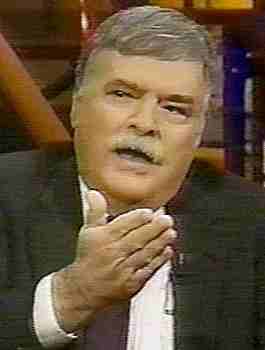
McCARTHY: I think, first of all, we have to say,
and I have to say, although I know it's going a little away from what you were
saying, I have just been accused of being a person who was working for the Turkish
government. This is a
lie.
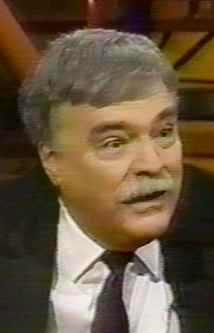 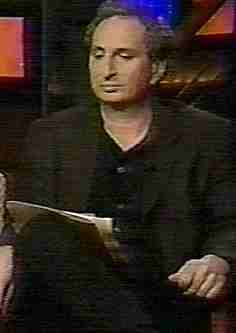
BALAKIAN: But Reuters has a piece about you that...
McCARTHY: I don't care what Reuters said...
BALAKIAN: But I have the piece here...
McCARTHY: ...It is a lie, it is not true.
SIMON: You did address the Turkish Parliament, didn't you?[12]
McCARTHY: I addressed the Turkish Parliament, for which, if that's working for the
Turkish government...
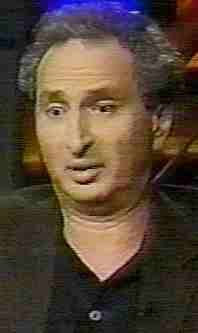 |
|
Balakian:
called on his creepiness,
pathetically tried to cover up |
BALAKIAN: Well, I think it's working with the
Turkish government...
McCARTHY: ...In any case...
BALAKIAN: ...In an advisory capacity.
McCARTHY: ...In any case, when someone insists on attacking the personality of the
historian...
BALAKIAN: ...Sir, I'm not attacking the personality.
McCARTHY: ...Generally because they don't have the facts, then this upsets me.
SIMON: I'm, I'm not sure your personality was attacked...[13]
BALAKIAN: No sir, not at all.[13b]
SIMON: ...And I don't want to attack it, but let's see if we can get back on, on
target. Why is the Turkish government, to certainly the appearance of the outside
world, unwilling to have Turks today entertain this debate?
McCARTHY: Well, actually, there's a couple of things...
SIMON: I know the debate, I know the debate goes on despite that, but people have
been in fact imprisoned...
McCARTHY: Well, for instance, Mr. Akcam's books are published in Turkey, for
instance, ah, so it is...
SIMON (addressing Akcam): How long, how long have you been in prison?[14]
McCARTHY: ...It is...
AKCAM: I was one year in prison, between 1976, '77...
McCARTHY: That has nothing to do with the Armenian case, though, I would say (laughs)...
AKCAM: Because of the, because of the {?}...
McCARTHY: It was a political matter. In any case, there is a debate in Turkey,
unquestionably. There are professors in Turkish universities who are in favor of
this issue. But the main thing that bothers me is that Turkey has a law that should
not be there, and this is a law that says you should not defame the Turkish
government, this is a silly law, they should get rid of it, (be)cause it allows
every small time prosecutor to bring a case that shouldn't be, that shouldn't
happen. But I want to make sure that we understand that Turkey is not the only
country that has a law. For instance, I can't go to France. I can't go to France,
why? ¸— and speak — because France has a law against my saying that there was
not an Armenian genocide, or more precisely saying it was a mutual genocide. I can't
go to Switzerland, because Switzerland has laws against that, and Switzerland puts
people in jail. Now, it is definitely wrong for Turkey, for Turkey to stop people
from saying what they want to say, especially professors who have a duty to profess.
But it is {?} definitely wrong for countries that we revere, like France and
Switzerland, to do much worse; because in Turkey, indeed, there are people who deny
the Armenian genocide and people who support the Armenian genocide; scholars who
have a definite conversation. But in countries like France, if you open your mouth,
you end up sued or in jail.
SIMON: Let me return to Professor...
BALAKIAN: Can I just respond that first, Mr. McCarthy, I read a two page article by
Reuters about you, advising closely the Turkish government on how to deny the
Armenian genocide in Europe and particularly, and you're quoted extensively.
(McCarthy shakes head, no.) I do have the article, but I'm sure you have it too...
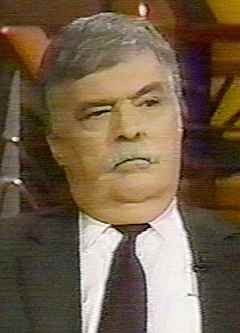 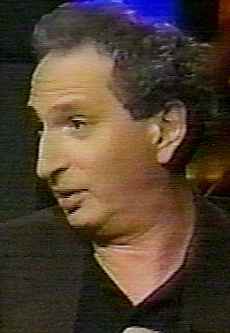
McCARTHY: Bring it out. It's a lie.
BALAKIAN: ... Because it was big news.[15] But
let me say this. We have to make a distinction between France and Switzerland and
their laws against hate speech.[16] And the
fact that right now two hundred writers and journalists are facing prison sentences
in Turkey for intellectual thought; thirteen of them have to do with the Armenian
genocide. My own publisher in Turkey, Ragip Zarakolu, is in Turkey tomorrow to face
trial for two books he published. In the 1990s, Turkey led the world in imprisoned
writers and intellectuals ahead of China and Syria, almost every year, ah, more
children tortured in Turkey than any country in the world; mostly, these were
Kurdish kids who were in jail.[17] The, the
history of, of violence against intellectual thought is intimately intertwined wth
the history of the Armenian genocide. And I would note that the documentary has such
a compelling moment in which it discusses the rounding up of Armenian intellectuals
in Constantinople, 250 of them, almost all of them who were tortured, killed, and
murdered {?}...
SIMON: {?} April 24...
BALAKIAN: At the very beginning. And it also spoke to the systematic nature of the
genocidal program, 'cause you cut the head of the state, the culture you want to
kill off first. And this happened throughout Anatolia, so that Armenia lost all of
its intellectuals in 1915 and 16.[18]
|
| |
SIMON: Let me raise with both of you, if I might, a question that was raised in the
documentary, which is, why is it important to you that this be labeled a genocide, as
opposed to a tragedy, or a war crime, or uhmm, a fiasco or a disaster?[19]
AKCAM: I have a more concern than whether we have to label as a genocide or not. [20]The main concern is whether Turkey should be a
democratic country or not. Whether Turkey should face its own history or not. Armenian
genocide is only a part of it. In Turkish history, we have a lot other human right abuses,
a lot other human rights violations, and if Turkey want to be a democratic country, and
want to be a part of European Union, Turkey should face its own history and it is, it
should not be a problem for Turkish scholars, intellectuals, to talk about the past.[21] It is not only related to Armenian genocide. It was
not easy to talk about the past, about the Kurdish issue, this was the reason why I was
arrested 1976, and it was today, for example, two days ago, Mr. Justin McCarthy, two
police officer came to the, a journal where I write regularly, Birikim, and ask me {?} to
the public prosecutor for an article that I wrote about the motive in genocide generally,
a theoretical article, and this is where we are. The basic problem in Turkey is if we
don't face our history, if we don't discuss the human rights abuses in the past, we can
not establish a democratic future. This is the basic problem, and Armenian genocide is the
major {of elemental}. Whether it's genocide or not, it is so unimportant, because
according to international law, you cannot describe it another way. It is impossible.[22] Today, we call in Yugoslavia killing of 7,000 men
as a genocide. So that it is not the basic problem.
SIMON: If you want to say something...
BALAKIAN: I would like to actually read what Raphael Lemkin, the man who defined genocide,
for the international legal community, wrote, in 1954, as he was struggling to get the
United States to pass the U. N. Genocide Convention, and he writes this: "This
convention (meaning the U. N. Genocide Convention) is a matter of conscience, and is a
test of our personal relationship to evil. I know it is very hot in July and August for
work and planning, but without becoming sentimental, or trying to use colorful speech, let
us not forget that the heat of this month is less unbearable to us, than the heat in the
ovens of Auschwitz and Dachau, and more lenient than the murderous heat in the desert of
Aleppo, which burned to death the bodies of hundreds of thousands of Christian Armenian
victims of genocide in 1915." I think that's a profoundly eloquent statement, and
also bringing a relationship between the Holocaust and the Armenian genocide. And this is
the man who invented the concept...
SIMON: Let...
BALAKIAN: ...And he was brilliant..[23]
SIMON: Let me turn to Professor Turan, and if you want to add something, Professor
McCarthy, by all means. Ahh, I think it's safe to say that whatever crimes the German
nation committed in the past, there are a lot of people around the world who admired the
way, over the past generation, individual Germans and the German government have faced up
to the genocide the Germans perpetrated, and not alone, during World War II, against,
against the Jewish people. And they have joined the community of nations, and they, and
they are admired, and, ahh, in NATO and the world community, we think nothing of a German
diplomat assigned to a place like Kosovo to head up an international mission because they
have, they have through their integrity and hard work, gained a seat back at the world
community of nations. Can Turkey do that, until they are willing to confront these events,
and not imprison people, who simply want to enter in this debate.
TURAN: Turkey should be more democratic country, and all the countries of the world should
be more democratic. There is nothing wrong with being more democratic. But democratic
doesn't mean, ahhh, accepting someone, ah, implements, ahh, someone forces you to say
something which is not true. As an historian, ahh, I thought we were here to, to discuss
ah, so-called gen, ah, Armenian genocide claims, but we are discussing so many other
things, and it's a bit confusing.[24]
SIMON: Would you like an opportunity to make another point about the history, from your
point of view?
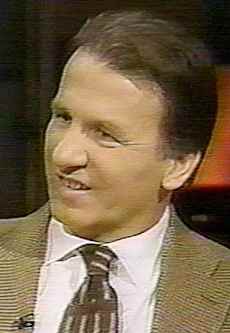 |
|
Turan could
not believe the host
could be so blatantly one-sided |
TURAN: Well, ahhh, why only Armenians? There were many
other non-Muslim communities, ahh, in Turkey, at that time. Why Armenian was especially
chosen. Ahh, in that documentary, ahh, they called Armenian intellectuals and cultural
leaders. What about revolutionary organizations? What about the Hintchak (Hunchak) Party,
what about Tashnak (Dashnak) Party, what about their rebellions, what about their
uprisings, what about declaring...
SIMON: I mean, if you broaden the definition, eventually it will get to extinguish, ah,
extinguish everyone. I-I don't... are you trying to re-define the victims? Or...[25]
(Shot of Prof. Turan, with a stunned, frozen expression.)
McCARTHY: Why didn't you mention the others. He's saying, why didn't...
SIMON: In the film?
McCARTHY: ...{?} the dead Muslims in the film. Why not mention all the other people...
SIMON: I'm not certain, I'm not certain that they weren't. At least if they weren't
specifically mentioned as a group.
(Sitting up in disbelief)
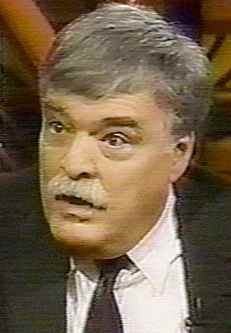 |
|
Now it was
McCarthy's turn:
Was this host for real? |
McCARTHY: Honestly?
SIMON: Yeah.
McCARTHY: You saw this in the film? I must have missed it.
SIMON: Well, I-I certainly saw references.[26]
McCARTHY: Well, references. But I must say, we are at the point that...
(Akcam interrupts; Simon requests that McCarthy continue.)
McCARTHY: We are hearing a lot about the reason the Turks deny this, the reason that,
we're hearing claims made about supposedly working with the government, we're hearing all
this kind of thing; the fact of the matter is, the real question is not the supposed
reason why Turks do this, the question was whether it happened the way they say it
happened.[27] And I say, that by looking at this
film, one gets a completely false idea of history. One gets misstatements, for instance,
about the so-called Special Organization, which was supposedly set up to kill Armenians;
which actually was set up to fight some Armenians all right. Armenian guerilla bands.
Which was quite different than massacring civilians. And which, no one to my knowledge,
has ever brought up actual evidence that they did this sort of thing. We see, we see
constantly, in the movie references to slaughters of Armenians, many of which actually
took place, but never a reference to the tremendous slaughter of Muslims. We never see the
fact that Muslims were slaughtered in greater numbers, and died first. We don't see any
reference to that. What we should be discussing is the actual history. And if people
disagree about history, then we should be having extended debates in other fora,
obviously.
|
|
SIMON: Professor Akcam? We've only got about three minutes left.
AKCAM: What happened in history has the traces. The Muslim that the Armenian killed
during that period, the Muslims, is a new legend. There were Russian, in Russian
army, Armenian volunteers. But Muslims killing of, the, by the Armenians, it is a
legend. It is not true, and...[28]
(Turan injects a few words.)
SIMON: There were Armenians who, who fought back...[29]
(A mild commotion; Balakian is laughing.)[30]
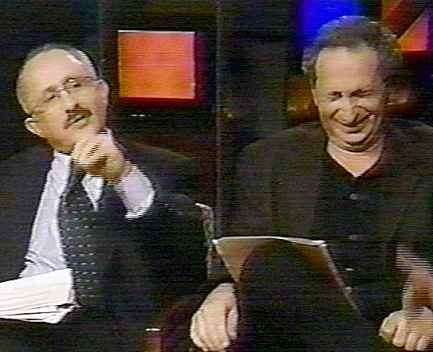
McCARTHY (looks to moderator, in frustration): This is simply not what
happened![31]
AKCAM: I'm not finished. There was a revenge act, there was revenge act, of, revenge
of Ormanian, ehh, Armenians {after} 1918-1919. There was party congresses of the
CUP, Union and Progress Party, who organized the genocide. If there were Muslim
killings by Armenians, in this party congress, they made a report, what the Armenian
activities was. They made a list of the Armenian activities. 1916 congress, 1917
congress, 1918 party congress. And these events that they're mentioning there, the
event that we now. This is Van, this is {?}, this is Urfa, most of them resistance
of the Armenians to the deportation.[32]
BALAKIAN: The resistance to death and...
AKCAM: I'm not done, I'm not done. One more thing I have to...
SIMON: We've only got a couple of minutes...
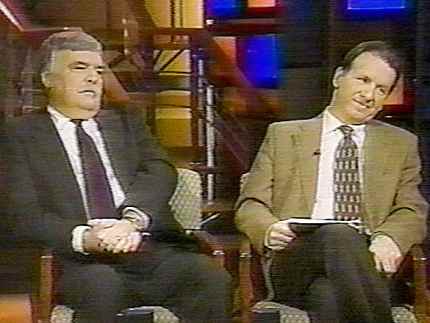
Tolerating Akcam, as he gets almost
hysterical
AKCAM: There is enough evidence that Teskilat-i
Mahsusa units were put on the job to kill the Armenians; it is that we have enough
testimonies, and enough evidences, in 1919 in the trials, the generals gave these
testimonies personally, and the governors gave these testimonies personally. They
were not Armenians, they were Turkish governors, they were Turkish generals, and
they said that Teskilat-i Mahsusa units implemented to kill the Armenians, and there
were a lot of members of these Teskilat-i Mahsusa units were sentenced by the
military tribunal in Istanbul.[33]
SIMON: (To Balakian:) But let me get you, because I'm going to give you the
last word.[34] (To McCarthy and Turan:)
Did you have, in the minute we have left, a response to, ah, the professor...
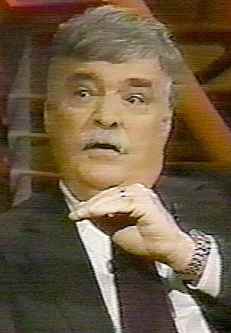 |
|
Justin
McCarthy |
McCARTHY: {?} ...That these are extended,
extended, difficult issues that should be discussed by historians, which I believe
is why the Turkish government proposed that a neutral commission be set up to study
this issue. Proposed that they would present scholars, the Armenians would prevent,[35] present scholars, that all archives would be
opened, that they would discuss this. The Turkish government officially asked this,
the Armenian government, of Armenia, refused, and the president of Armenia stated he
did wish to have a neutral commission because this was a political issue. Now that
seems to me to indicate that all these statements probably are not very accurate
about the Turks not wanting to come to a {truce}.
SIMON: (To Balakian:) What about professor...
BALAKIAN: The Turkish government's ah, attack on this history is so well documented
that it's a scandal in modern history. And what Professor McCarthy has said is
absolutely not true.
(A reaction shot of McCarthy, raising his eyebrows.)[36]
BALAKIAN: But let me just say this one final thing; if we're going to pretend to do
history without assessing power, and the meaning of power, and we're going to
pretend that a stateless minority population, Christian minority population, ah,
unarmed, is, is somehow in a capacity to kill people in an aggressive way that is
tantamount to war, civil war, we're living in the realm of the absurd. Taking the
basic {Fulconian} notion of power here is just a basic understanding of history.
Were there some Armenian resistances? Sure, as Professor Akcam has spoken, a little
bit like the Warsaw Ghetto. People don't want to die as sheep.[37] But I think what the documentary does so brilliantly is that it
shows you the evolution of a culture of massacre against this Christian minority
population that presented a problem to the Ottoman government, and how the evolution
of this culture of massacre went from the Hamidian massacres of the 1890s to
full-scale genocide in 1915.
SIMON: Gentlemen, I want to thank you all very much for participating in this
conversation; we've seen a very powerful film and, ah, certainly understand that,
ah, that the issues that it, ah, raises continue to provide powerful discussion and
perhaps instruction for the future. Thanks very much for being with us, ah, this
afternoon. And we want to thank, ah, people watching at home, ahhh, for following
the film and this conversation. I'm Scott Simon. Thank you.
Producers: David Davis, Nadine Jelsing. Director: Sean Ceigersmidt. 2006, Oregon
Public Broadcasting
|
| The
Analysis |
Since PBS
"fixed" this debate in favor of their own propaganda show, choosing a
biased moderator who defended the "genocide" at every turn, it's only fair
to examine the statements and dynamics of this "debate" in
greater detail. First, a look at the host.
|
| The Host |
Scott Simon is host of "Weekend Edition Saturday" on NPR, the radio end of
America's "Public Broadcasting." This is generally a fine and reliable outlet,
as is PBS, the television end.
A response I received from a PBS affiliate, KPBS, while inquiring about the PBS propaganda
show, before its airing:
The intent of the discussion is not to give special credence to an
opposing point of view, or to make apologies for the documentary — it is a forum for
both sides to meet and openly discuss their views, and attempt to understand how these
facts should be worded in historical texts/discussions. Further, keep in mind that the
moderator is Scott Simon, an excellent NPR journalist who is a
professional when it comes to moderating discussions of this nature. We believe
that he will be a fair and effective moderator, and we have faith that he will make sure
all points of view are fairly heard, and insist on a factual and enlightening discussion.
Sarah
Audience and Membership Services
When I read that, I was somewhat relieved, knowing Scott Simon to be a fair man, and I
suppose I was looking for anything to hang on to, in full knowledge of the awful
propaganda PBS would soon be perpetuating. I conveniently forgot, however, that Scott
Simon was a "liberal." That's the camp I'm in line with as well for the most
part, but as we all know, blind belief is not the sole domain of conservatives,
particularly neo-conservatives. Hardcore liberals
hate Turkey (as do hardcore conservatives, the latter primarily for religious
reasons.) Too many moderate liberals also side with anti-Turkish forces, not because they
are blind to reason as the more extremist liberals, but because
[A] There is anti-Turkish prejudice in the West to begin with, affecting everyone, and
[B] Moderate liberals, quite naturally, accept the prevailing "liberal" view on
peripheral subjects they have no emotional stake in closely examining. Human rights groups
(a favorite "liberal" cause) have hypocritically concentrated on making a
favorite whipping boy of Turkey, while turning a relative blind eye to the excesses of
many other nations. (For example, the dictator state of Armenia.) Beyond the racial
prejudice that hits everyone (even "liberals" are affected by this human
condition.. if all one hears about a particular group is negative, even the fairest among
us can be influenced), the anti-Turkish forces are all in it together. (As Steven Mufson
summed up in a Washington Post article
from October 9, 2000: "The Armenian Assembly has also made allies with
Greek Americans and human rights groups, longtime critics of Turkey.")
However, one would think a liberal like Scott Simon would have known better. As a
professional journalist, he has a duty to be impartial. The code of ethics of NPR,
co-written by Jeffrey Dvorkin (who also appears to blindly accept "Armenian
genocide" claims, based on a very fair April 5 article he wrote on Turkish
journalists: "Many in Turkey consider the deaths of up to 1.5 million Armenians to
be the first Holocaust in modern times"), specify:
3. Might my personal feelings have affected my
handling of this story in any way?
"In pursuit of Fairness, Accuracy and Balance," p. 15, "Independence and
Integrity II."
And Simon is smart enough to know about the tactics of propaganda films. While criticizing
fellow liberal Michael Moore, Simon wrote:
"A documentary film doesn't have to be fair and balanced, to coin a
phrase. But it ought to make an attempt to be accurate. It can certainly be pointed and
opinionated. But it should not knowingly misrepresent the truth."
"When Punchline Trumps Honesty: There's more McCarthy than Murrow in the work of
Michael Moore," July 27, 2004, opinionjournal.com
|
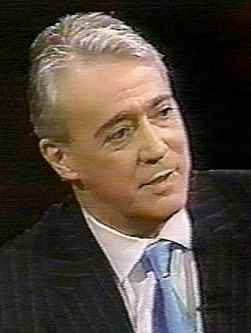
|
|
Scott Simon |
Yet note even a smart guy like Simon simply accepted
the claims of such an obviously manipulative and propagandistic film, like Andrew
Goldberg's PBS show. (Even if one agrees with the claims, shouldn't the over-the-top
techniques, like the manipulative music and tricks — juxtaposing modern Turks with
Nazis, for example, techniques Joseph Goebbels would have been proud of — have tipped
Simon off, to look a bit more closely?)
But even fans of Simon know he failed to live up to his professional duty. A letter from
PBS Ombudsman Michael Getler's column (The Ombudsman's Mailbag, April 28, 2006):
I had planned to write my comment to you before I discovered your review
of the program on the Armenian genocide. I have no dog in this fight, being neither
Turkish, Armenian, or affiliated with anyone in either camp. Your review was most
enlightening and thoughtful.
Here is my concern: Though a fan of Scott Simon, I was disappointed
by my impression that he clearly seemed to "side" with the Armenian scholars on
the panel. His vocal tones, facial expressions, and dialog departed from that of
critical skepticism of the positions of McCarthy into being frankly dismissive of them. He participated instead of moderated, and he seemed to me to be the
"fifth" panel member. This allowed the Armenian defenders to drift into
personal attacks without interference by Mr. Simon. When McCarthy near the end of the
panel time finally protested that he thought he came to debate the historical facts, I
tended to agree that the moderator made too little effort to keep
the panel focused on the available facts. If, as the Turks assert, that millions of
Turks died first, and at the hands of the Armenians, Mr. Simon could have focused
attention to the location and veracity of the sources of those "facts." If the
sources and veracity of those facts are unconvincing and weak, then so is their argument,
and it's there for everyone to see and judge. Mr. Simon could have focused the group on
the undeniable fact of the expungment of history by the Turkish government, and explored
the reasons and avenues of change.
The panel discussion and the documentary itself, was weakened by the absence of scholars
of the stature of Bernard Lewis, as well as a moderator who seemed less than neutral. The
question arose in my mind, was Scott Simon more concerned about the
perception viewers might have of him, than his task at hand of forging a meaningful
exchange from panelists with obvious personal tensions between themselves?
Charles Sherwood, Jackson, MS
Simon's prejudice disallowed him from conducting even the most basic historical research,
like having no idea who Admiral Bristol was, and thinking that the Hunchaks and Dashnaks
were innocent Armenians in line to be exterminated. Simon was perfectly content to allow
his surface knowledge of hateful Armenian propaganda to guide him.
Simon was so firmly convinced the "genocide" was an established fact, the nature
of questions he asked were political ones intended to show how "bad" Turkey was,
rather than trying to separate genocidal fact from fiction. This is one of the reasons
that allowed Peter Balakian to express overt glee at one point, while Akcam was
emotionally making dishonest claims, which Balakian knew would come across as convincing.
It is no wonder that the debate came across as believable to those already influenced by
genocide propaganda. For example, Alessandra Stanley, in an April 17, 2006 New York
Times look, was very partial to the claims of the film (also using Simon's
descriptive word: "powerful"), and was much in the corner of Balakian and Akcam
(she added the latter was a "well-known defender of human rights in Turkey"),
as both "lucidly pick Mr. McCarthy's points apart." Stanley, like Simon,
is already a confirmed believer, and sees what she wants to see. The lies of Balakian and
Akcam come across as sweet music to those who just know the Armenians were innocent,
defenseless Christians, and the Turks bloody barbarians.
Stanley further opined, "Tone and appearance on television can be as persuasive as
talk. Mr. McCarthy mostly sounds condescending and defensive, while Mr. Balakian is smooth
and keeps his cool." When the decks are stacked in one's favor, it's easy to be
cool. Balakian was sitting very prettily, since even the host was his ally. (The one point
Balakian lost his cool — his facial expressions contorting in the most delightfully
sniveling manner, in the knowledge that he was "caught"— when McCarthy called
Balakian for the liar he was, Balakian still had little to worry about. Simon would defend
Balakian.)
|
Balakian Gives
"Buddy" Scott Simon High Marks
I find Ms. Atlas’
explanation for the post-show program a bit disingenuous. She claims that its goal
was not to provide a “platform for those who deny the genocide,” but to “explore
how serious historians do their work and look at evidence.” However, by inviting
two professional deniers (who have worked close[ly] with the Turkish government) on
to PBS, a large platform was provided for the repulsive lies, known as denial. And,
in the twenty-five minutes we had there was not even a remote possibility that the
show could explore how historians work. As fine a job as Scott Simon did hosting
it, the post show is a staged “bake-off” and sadly a forum that abused the
reality and memory of one of the major human rights crimes of our time.
Peter Balakian, letter to Michael Getler, March 22, 2006. What an awful slanderer.
Exposed for being a liar regarding McCarthy's having "worked... with the
Turkish government," given that his "Reuters evidence" proved no such
thing, what evidence does Balakian have that his other opponent, Prof. Turan, has
been an "agent of the Turkish government"? Is Balakian's
"evidence" the fact that Turan is a Turkish professor working in a Turkish
university? That must be it; Balakian slimily loves to present the notion that every
Turk, in what Balakian calls the "totalitarian" nation of Turkey, is a
mindless "agent of the Turkish government," except for Halil Berktay. How
interesting that this utterly creepy man is taken so seriously by people like Scott
Simon and David Davis.
CPB Ombudsman's Two Cents
The Corporation for Public Broadcasting (CPB) is kind of the "boss" of PBS
(Public television) and NPR (Public radio). Its ombudsman, Dr. Ken Bode, did not
bode well with his view on the subject ("The Armenian Genocide," April 28,
2006), yet another lazy-thinking adherent of the Armenians' propaganda: "My
conclusion is that this was an excellent documentary, well supported with historical
fact and expert witnesses." Among many troubling points raised, Bode easily
gushes over Samantha Power's insensitive and hateful remarks. He also offers this
description:
Consistent with the PBS position on "settled
history," the objective of the panel was to "explore more deeply the
question of why the Turkish government and its supporters continue to reject the
genocide label."
Such widely differs from Atlas' description of the panel's objective that Balakian
quoted in his letter above, "how serious historians do their work and look
at evidence,” and the KPBS description featured at top ("it is a forum
for both sides to meet and openly discuss their views, and attempt to understand...
these facts.") I have never heard Bode's description before, as much as I
have been following this matter in numerous reports. The "Atlas"
explanation was the true one, since McCarthy and Turan obviously appeared in the
belief that they would be discussing history; they would have never come aboard if
they were told the idea was to put them on the spot, and that they would be expected
to explain basically why Turkey is so "evil." I have a feeling Bode's
explanation was worded after the hoopla, in part to justify PBS's biased and
ignorant judgment of history. Yet, Bode's description is exactly how the panel was
conducted: Simon's questions centered on putting McCarthy and Turan on the spot, and
Simon could not have cared less about the historical issues... evidently convinced
as he was what the "real history" amounted to. Therefore, if Producer
David Davis lured McCarthy and Turan to the show by providing Atlas' explanation
only to perform the old bait and switch, the production committed a fraud.
Yet Dr. Bode raised this very valid point:
The group should not have included members who already had
their say in the preceding documentary, and care should have been taken to be sure
that all participants had an adequate facility with English.
Since Bode also adds that "the discussion was taped at National Geographic
studios in Washington, D.C.," and not in Oregon as I thought (because OPB's
Davis served as producer), then we must add one more element to Bode's valid point;
the partisan producer David Davis also should not have been included.
|
The honorable thing for Simon to have done, when he was offered the job of moderating this
debate, would have been to say to the producer that Simon could not accept the job. (Like
a judge who must recuse himself in a case where the judge has a conflict-of-interest.)
Simon could not accept, because he is already a believer in the "Armenian
Genocide," and that belief would get in the way of fair moderation, as it so
painfully did. (Assuming, of course, that the idea was fair moderation; as may be seen
directly above, the CPB ombudsman indicates that was not the idea.) However, Simon's
"boss" here, OPB's David Davis, is also a firm genocide believer, judging by
dishonorably allowing Andrew Goldberg and Peter Balakian to get away with any and every
claim in the film itself. It's very possible Davis wished to stack the deck in his favor,
by deliberately choosing a partisan host, so that (along with insuring a member of the
opposition team's language skills would render him practically void) the end result would
truly be "three against one."
|
The Program
|
1. Akcam's degree is in sociology. In good
conscience, he cannot be called a "historian."
2. Akcam was brought into the USA by Dr. Dennis Papazian. Local Turks forced
Akcam out of the University of Michigan because his case did not abide by the
university's rules for visiting professorship. That other hotbed of Armenian
propaganda, the University of Minnesota,
evidently altered its rules to accommodate Akcam, perhaps with the help of Stephen
Feinstein. Akcam no longer has a home university in Germany to be
"visiting" from. It does not look like he ever served on a faculty in any
German university. Akcam's position as a perpetual "visiting professor" is
reportedly subsidized by the Cafesjian Foundation. If it was not for his Armenian
benefactors, the undistinguished academic would have no opportunity to be spreading
his poison in an American university (or upon America's shores), and would perhaps
still be sweeping floors in Hamburg. It was for valuable cases as this television
program, a "Turkish scholar" affirming the "genocide," that
Akcam has been well paid for. Akcam's one-time friend and fellow ex-terrorist, PKK
thug Abdullah Ocalan, charged: "(Akcam's)
personality is dubious... He is open for manipulation in the future."
3. "Beauty is in the eye of the
beholder." There were no "killing fields" in the film.
Photographs, the origins of which can't be vouched for, showed suffering and sometimes dead, but (of the
latter) we don't know what the context was. (For example, a shot of people hanged.
Who were those people? Why were they hanged? If they were Armenians, were they
hanged for being Armenians? If that was the case, why was not every single Armenian
hanged? Or is it possible that these people had broken the law, for which the
penalty would have been death for any Ottoman?) Simon should have known that all
"cattle cars"
are not alike. As far as "vivid descriptions," those concerned the lot of
the suffering. Suffering does not equal genocide. There is not a single,
non-Armenian "firsthand" account of a massacre. That does not mean all the
Armenian tales were false, but unfortunately, there is too great a record of
Armenian falsification. There were certainly massacres, but massacres in themselves
do not prove a genocide. These examples that Simon naively cites as
"evidence" do not count as factual evidence.
4. McCarthy would make reference to
"mutual genocide" again in the program, but note this appears to have been
an "off the top of his head" description, and this first reference is
preceded by "perhaps." (And the second reference — "France has a
law against my saying that there was not an Armenian genocide, or more precisely
saying it was a mutual genocide" — was a shorthand reference regarding
the taboo on the other side of the coin, Armenian extermination effort against
Turks.) What McCarthy was doing here, to my ear, was echoing the sentiment of Prof.
Bernard Lewis, who stated in an interview, "[N]owadays the word 'genocide'
is used very loosely even in cases where no bloodshed is involved at all."
This was dangerous territory, because as McCarthy well knows, the word
"genocide" is applied in the Armenian case exactly as what the Nazis had
done to the Jews. McCarthy certainly does not believe that. He stakes his belief in
the historical reality that there were times both groups tried to kill off the
other. Whether the order came from the top, as far as the Ottomans' end, lies at the
very core of the genocide argument. There is no evidence to convict the Turks of a
systematic extermination effort. However, as McCarthy himself reported regarding —
for example — Erzurum, the
Armenians killed for killing's sake, and these cases were not isolated, as in the
case of the Turks. This is why many, many
more Turks, Muslims, and other non-Christian Armenians were slaughtered than the
number of Armenians who died strictly from massacres.
5. Peter Balakian wastes no time in employing
his unethical Dashnak-style "the end justifies the means" attack.
Note that he simply counters McCarthy's facts with the notion that it's a
"fantasy," but offers no evidence to prove it. The revolt in Van has been well documented. Even before the
disturbances taking place in early 1915, Armenians rebelled in Van as soon as Russia
declared war, in early November of 1914... as vouched for by no less a favorite
Balakian source than The New
York Times. Armenians slaughtered the Muslims of Van by the tens of thousands,
and the "deportation decision"
resulted from the Armenians' criminality and betrayal. (The only talk of
"deportation" on April 24 concerned the Muslims of Van, as the governor
inquired about moving them out, threatened
by rebellious Armenians, as they were.) It's very typical of these unscrupulous
genocide partisans to handle facts they don't like with the simple charge of "Liar,
liar, pants on fire." The real lying is on Peternocchio's end, and he
begins his campaign of dishonesty by claiming genocide talk in Turkey as "taboo
and illegal." McCarthy will later correctly state that Akcam's genocide books
have been on sale in Turkey, as an example, showing up Balakian's disregard for
truth. But Balakian's worst attack is making it seem as though McCarthy is an agent
of the Turkish government, which will be addressed more fully in a moment.
6. Newspaper accounts were often third-rate
accounts. The sources were Wellington House, Britain's propaganda division allowed
to also operate on American soil, as well as Armenians and missionaries, the latter
of which can hardly be pointed to as reliable witnesses, with their "mission
from God" (as evident in their prayers) to vilify Turks. Perhaps the only
American journalist allowed to travel into the Ottoman interior in 1915, that is, a
rare example of a genuine "firsthand account," concluded there was no "genocide."
7. Once again, please make sure whether those
were really "firsthand accounts," and also try to determine whether these
"firsthand accounts" might have had reason to be untruthful. You would
think a "professional journalist" such as Scott Simon would be the first
to concede one can't always believe what one reads, simply because it's in print.
Secondly, arbitrary claims should not be given equal weight to the conclusions of
the impartial U.S. High Commissioner, whose people received reports from every
corner. Unfortunately, Simon is way too ignorant for the job.
7b. Yes, Prof. Turan's level of English
left something to be desired, but it's not like Turan's point with this exchange was
impossible to follow. I can't believe Simon would be that slow, but he gave several
other indications throughout that his dimmer switch was on. Simon simply chose to
ignore Turan's point, as Simon was evidently in a rush to get Turan's view on
whether the evil Turks killed "millions." Pretty disgraceful.
8. McCarthy's carefully constituted
demographic figures results in a final tally of 2,736,000 ("Who Are the Turks") as the Muslim loss
in Anatolia, from 1912-1921. The common consensus for dead WWI "Turks" is
2.5 million. How interesting that Taner Akcam is going out of his way to minimize
the mortality of his "own." In addition, Akcam is trying to make it sound
like he has conducted a lot of personal research in the archives of the countries
mentioned. I don't know how he would have had the time or, in the case of the
Ottoman archives, the opportunity. The Armenian propaganda machinery had already
conducted the most meticulous research before Akcam was a blip on the radar
screen. I would believe that he is mainly making use of what has already been
uncovered, and like his friend Fatma Gocek,
attempting to come across as "scholarly," putting across the notion that
he has conducted personal research. (He did spend time as a researcher while in
Hamburg; perhaps he dabbled in the German archives.) ADDENDUM,
3-07:Akcam has been sighted at least once, working in the Turkish archives.
9. Akcam provided a different story in a
radio interview: "...I was
arrested in 1976 because of the article I wrote in a students’ newspaper. The
reason why I was arrested is that I wrote that there are Kurds living in
Turkey." The real fact is that Akcam was imprisoned for being a terrorist.
He played a part in the violence of Turkey's tumultuous 1970s, where anarchy reigned
at times, and people were being shot on the streets for belonging to the right or
the left. For example, on November 4, 1975, Akcam reportedly participated in an act
of violence in Malatya, which resulted in an injury to a cab driver. An old
terrorist friend went so far as to accuse Akcam of murder, and of causing "heavy casualties." (Certainly
we must be careful before accepting the word of terrorists. Similarly, we must also
pause before accepting the word of Taner Akcam.) ADDENDUM,
3-07: No one can know with certainty as to the violent depths Akcam sank to in
the practice of terrorism; the reason why he was imprisoned was for having spread communist propaganda, and for his
efforts in destabilizing the Turkish state, working to bring his nation under the
influence of the Soviet Union. The so-called "evil empire" played a large
hand in financing the left, during the 1970s.
10. Akcam heard his partner say: "(Turkey)
has made the Armenian genocide taboo and illegal" minutes ago, and exposes
Balakian as a liar!
11. Note this typical line of questioning.
Yes, PBS and Simon might have "accept(ed) and acknowledg(ed) the
genocide," but the reason why McCarthy and Turan are on the show is because
they dispute this conclusion. Here Simon is wondering why Turkey is having
difficulty with the word "genocide." Could it be for the same reason that
Simon would have difficulty with terms such as "rapist,"
"murderer," or "child molester," if he were on the receiving end
of such ruinous charges, based entirely on hearsay? But of course, Simon is utterly
unqualified in asking the kinds of questions he should have been asking, historical
questions, because he did not even perform the minimal objective historical
research.
12. You know the cliché in mystery/crime
novels or movies where the suspect unwittingly reveals a key detail like, "when
was he drowned?", to which the detective replies, "I never said he
was drowned"? BUSTED! Similarly, how odd that Scott Simon, revealing
total ignorance on historical details such as Admiral Bristol or the Dashnaks, would
happen to know McCarthy had addressed the Turkish Parliament. Balakian didn't reveal
that little detail in his charge. Do you think Balakian took Simon aside before the
show, perhaps with Armenophile OPB boss Davis, and said, "Pssst! Here's how
we can trip up the denialist." (Maybe Balakian used the term "white
supremacist" to describe McCarthy; that is the comparative term Peter Balakian
actually used to describe McCarthy, in PBS's Current Magazine.)
13. We can certainly expect Peter Balakian
to pathetically "deny" his vicious ad hominem attack on McCarthy's
character, since Balakian prides himself on Dashnak dishonesty. But what is Scott
Simon's excuse? What is Scott Simon talking about, that he's not sure McCarthy's
personality was attacked? Balakian sleazily suggested, on the basis of no evidence
(coming up), that McCarthy worked for the Turkish government. Balakian has gone
around sleazily suggesting this against McCarthy and other contra-genocide scholars
(Balakian helped spearhead such an attack on
Prof. Heath Lowry in 1995, knocking Lowry out of the debate), the fact that they
are "agents of the Turkish government," but this might have been the first
time he dared to say as such to the face of one of his victims, and he deserved to
get punched on his nose. We can kind of understand Peter Balakian, because he was
just being Peter Balakian, but how atrocious that Scott Simon not only wasn't
outraged, he actually defended Balakian. This was an attack on one's reputation, of
the worst order. The idea Balakian was clearly conveying was that McCarthy was being
paid off, thus selling his soul, and compromising his integrity. (Simon's very next
line was that he didn't want to attack McCarthy's character either. What did that
mean?? Was he patronizing McCarthy, as though McCarthy was being immature and
overreacting? If anything, McCarthy showed incredible restraint.)
13b. We can almost read the thought
balloon over Balakian's head: "Whew! Thanks, Scotty, old pal, old buddy, for
coming to the rescue. Us 'human rights' champions need to stick together, against
the denialist villains." Balakian plays his Dashnak role to a tee. First,
he commits his act of destruction. Then he innocently says, "Who, me?"
Such a poor, defenseless, unarmed, Christian martyr.
14. Fortunately, McCarthy addressed this
horrendous stupidity on Simon's part. What did Akcam's prison sentence have to do
with the Armenian "genocide"? But Simon appears not to have been concerned
with the "genocide"; he was only interested in showing what a "bad
boy" Turkey can be, imprisoning poor, innocent "human rights
champion," Taner Akcam.
15. If it was "big news," the
event of McCarthy's going to speak before the Turkish Parliament would have been
covered everywhere, not just Reuters. Balakian has some nerve to return to his
shameful charge again... the man is simply out of control. Let's put a rest to his
baseless slander. The reader can go to TAT's Peter Balakian page, and read the relevant and McCarthy-related
portion of the Reuters article. There is nothing about McCarthy "working"
for the Turkish government, there is nothing about McCarthy "advising" the
Turkish government. When one is invited to give a speech, because one is recognized
as a specialist in a field based entirely on one's individual accomplishment or
research, that would normally be considered an "honor." Similar to, as the
reader may read further above on the Balakian page, how Balakian gave a speech in
the Museum of Tolerance; nobody can say Balakian was "working" for the
Museum of Tolerance. (McCarthy's speech may be read here. After concentrating on
the historical events, he sums up that the genocide is a lie, and that the Turks
should not give in to such a lie, in their desire to join the European Union. If
this is what Balakian is pointing to as "advising," he should keep in mind
these are McCarthy's heartfelt conclusions that he wished to share. These are the
presentations of ideas in a speech. Ideas are what speeches are about.
"Advising" is something that takes place behind closed doors.) How
absolutely despicable to twist this honor, and make it appear as though McCarthy was
compromising his integrity. The genocide advocating Dutch historian, Prof. Erik
Zürcher, was awarded the rare "Medal of High Distinction" by the Turkish
government in June 6th of the same year. Does that mean Zürcher was working for the
Turkish government? Balakian wants to show that the Turkish government is so
"evil," that anyone who deals with the Turkish government must be in
cahoots, and similarly evil. The only true evil that emerges in a case as
this is from the hateful proponent of such a charge.
What About Advising?
We can see giving a speech has nothing
to do with "advising," but what happens when a professor does give
advice, behind closed doors? For example when Prof. Richard Hovannisian was
elected into Armenia’s National Academy of Sciences in 1990, should Roger
Smith, Eric Markusen and Robert Jay Lifton have written a paper on Hovannisian's
"Professional Ethics"?
Balakian had succeeded an earlier time
he smeared a contra-genocide scholar with this charge, when he helped
spearhead an attack
on Prof. Heath Lowry in 1995. (At the time, Balakian labeled Lowry a
"propagandist," just as he indirectly called McCarthy a "white
supremacist" in 2006.) Lowry did not sell his soul in any way. He had
come upon his own historical conclusions, through independent scholarship. The
Turkish ambassador at the time, not historically adept, needed enlightenment
and asked for Lowry's advice. Lowry gave his advice regarding Robert Jay
Lipton's unprofessional and blind devotion to a singular source, the deceptive
Vahakn Dadrian, aware as Lowry was of the damage being caused by the lies of
Armenian propaganda. Lowry's only duty lay with the truth.
But Balakian made it sound as though
Lowry had compromised his academic integrity, purposely lying for the Turkish
government. Naturally, Balakian had no proof of a "pay-off," which
would have justified Lowry's supposed dishonesty. (The real proof lies in
Lowry's research. Challenging facts is harder for someone like Peter Balakian,
as we have seen in this PBS debate; that's why Balakian opts for sleazy low
blows.) Just the charge of "working for the Turkish government" is
enough for the likes of Peter Balakian, knowing as well as he does what a
black eye the reputation of the Turkish government has, thanks to the efforts
of unscrupulous parties such as Balakian.
This is why Peter Balakian has gone
out of his way to describe Turkey as a "totalitarian" state. Anyone
who has a connection with such an "evil" nation must be condemned
for being similarly "evil." Balakian was hoping for lightning to
strike twice, in his attempt to damage McCarthy's reputation. Balakian
is fully aware prejudiced parties like Scott Simon and others in public
broadcasting are aligned with this view. As before, the only true evil
that emerges in a case as this is from the hateful proponent of such a charge.
|
16. The reality is that the influential and
often intimidating Armenian diaspora exploited the rules on the books regarding the
Holocaust, as well as the anti-Turkish feelings of the French and Swiss politicians.
The hate speech is not negating the myth of the Armenian "genocide." The
real hate speech takes place in affirming it. The affirmation takes place without
factual evidence, thus contributing to the further hatred against Turks. And let us
not lose sight these original laws that the Armenians have hijacked are based on a
proven genocide. Comparing a true
genocide to a fake one serves to cheapen and dishonor the victims of the real
genocide. (And even if we concentrate solely on "hate speech" laws
regarding the Holocaust... are we supposed to approve of countries like France,
Switzerland and Austria, actually jailing people for what they believe, as wrong as
what they believe might be?)
17. The fault in allowing Peter Balakian on
a PBS show rests really much less with Peter Balakian, who can't seem to mentally
help himself, than the PBS people in charge, like OPB's Davis. David Davis should be
ashamed of himself for allowing such a liar like Peter Balakian on PBS's precious
airwaves, and freely disseminate such "hate speech." So Peter Balakian is
asking us to believe, without providing any evidence, that children — that is,
those before puberty, aged perhaps 2-12 — are not only imprisoned in droves in
Turkey, but are "tortured." It's incredible.
18. There was no "Armenia" in
1915-16, save for the minds of wishful thinkers. Is this a "Freudian Slip"
by Balakian, admitting that the Armenians of the Ottoman Empire were not really
faithful to the nation that treated them so well and allowed them to prosper for
over half a millennium? So if these Armenians rebelled, who could have planned such
a rebellion? Naturally, it would have had to be the "intellectuals and cultural
leaders." Last we looked, turning traitor to one's country results in the
heaviest of penalties in any nation, which usually means execution. If the idea was
to murder all of the Armenians arrested on April
24, none could have survived; among the survivors was Balakian's own relative. And obviously, despite
Balakian's sob story, not all of the "smart people" of Armenia could have
been knocked off, otherwise no one could have ruled eastern Anatolia for a few
years, nor the soon-to-be-born Republic of Armenia. (Not to say the people in charge were
necessarily smart, of course.)
19. For the record, this was Simon's only
"tough question" for his team. Never mind that it was not really answered.
20. Akcam was singing quite a different
tune earlier in his career, when he wrote "The Genocide of the Armenians and
the Silence of the Turks" (well... we don't know who really wrote it,
judging by its excellent English), where the word "genocide" was repeated
an unbelievable 64 times. He is not being entirely sincere here, by stating
he's not so concerned about "genocide," but what else is new? (He states
here that his "main concern is whether Turkey should be a democratic
country." Just one year before this debate, in a radio interview, Akcam stated he had "no time" because
"working on the Genocide is more important.")
21. Didn't he just tell us the Kurds are no
longer a closed subject, and neither is his precious genocide? So why is he telling
us Turkey had better get its act together? More importantly, this convicted felon
who sold out his own nation is not in a position to advise on what constitutes a
civilized country. Furthermore, how many countries on earth dwell on their past
historical ills? Are Americans obsessed with the Indians, slavery, the Philippine
War, the Vietnam War? What a ridiculous double standard. What is he suggesting,
Turks should hate themselves, in the similar manner that Akcam has a disturbing
anti-Turkish chip on his shoulder?
22. Because Akcam has succeeded in going
around and making people like Scott Simon believe Akcam is a "historian,"
is Akcam now telling us he has equally succeeded in becoming a specialist in
International Law? Here is a little look at how the international law of 1915, the kind other nations held high for
themselves, applied to the Armenians. If Akcam is trying to tell us the 1948 U.N.
Convention is in agreement with the Armenian example, others may see if he is correct.
23. I don't know that much about Raphael
Lemkin; I'm sure he was an intelligent man, but because he coined the term
"genocide" does not make him "brilliant." If anything, his
brilliance has a very dull shine, if he allowed his prejudices to run away with him,
and did not bother to scratch the surface beneath the Armenian "genocide"
claim. One might say he was a role model for today's "genocide scholar," and these
people who come up with their faith-based conclusions first and then build their
cases with selective evidence later are anything but real scholars. What's
more, they suffer from a shameful lack of ethics, branding people genocidal killers
without factual evidence. (While ignoring the many other cases of historical
extermination efforts, because they are not politically worthwhile, or as
profitable. Who is going to buy books or watch TV shows regarding extermination
efforts against Turks, for example?) This is what Raphael Lemkin did in the case of
the Ottoman Turks, and such a man deserves contempt, not praise. None of us would
like an accusatory finger pointed at us, strictly on the basis of hateful hearsay.
And get a load of Lemkin's ridiculous line, "...the murderous heat in the
desert of Aleppo, which burned to death the bodies of hundreds of thousands of
Christian Armenian victims." If these bodies were burned "to
death," that implies they were alive before. What does that mean, simply being
in Aleppo's heat did them in? Does the Aleppo sun roast bodies to death? And were
these "Christian Armenian victims" actually in the "desert"?
Sure, it must have been hot, but the areas were near the rivers, historically known
as the "Fertile
Crescent." What killed the bulk of the Armenians was famine and disease,
the same factors that killed the bulk of the 2.5 million other Ottomans we never
hear about. It looks like Lemkin was not free of his own racial prejudices, totally
ignoring what had happened to these other people, perhaps because they were Muslims.
Otherwise, why did he choose to add the word "Christian," when he
described the "Christian Armenian victims"? Did their Christianity make
them more worthwhile human beings?
24. Poor Prof. Turan did not have a chance
to excel in this English-speaking forum, but this point of his nailed it on the
head.
25. This exchange was worth the price of
admission. You can see in Prof. Turan's face that he realized the impossible
situation he got himself mixed up in, and barely uttered a word after this revealing
moment. Imagine that Simon was so lost in his "Turks are evil" genocidal
thoughts, that Simon actually thought the villains of the equation were to be
regarded as the typical, innocent, Christian Armenian martyrs.
An Armenian Propagandist Sounds Off on this Show
Dr. Dennis Papazian, from an e-mail to
Harut Sassounian:
“I have just previewed the post documentary discussion and
it made me sick to my stomach to see Justin McCarthy and the Turks come out
with blatant lies and deceptive assertions. I thought Taner and Peter ‘won
the debate,’ but the denialists undoubtedly would plant doubt in the minds
of innocent American viewers... You did right to lead the attack against the
showing of the ‘discussion.’"
What exactly were these "blatant lies and deceptive assertions,"
from the end of Justin McCarthy and the "Turks"? Ask Papazian, and
he will have no end of examples. The trouble is, his examples have no
foundation. See how he managed when he tried to expose the supposed deceptions of another
"denialist." It is the duty of these pro-Armenian propagandists to
make accusatory condemnations. But when you corner them and don't let them get
away with their nonsense, and since they will never be "man" enough
to admit wrongdoing, the only thing they can resort to... so lacking in the
genuine facts as they are... is to stick out their tongues and cry, "Liar,
liar, pants on fire."
|
26. Wow! I am so impressed that McCarthy
managed to keep his cool. While there was a quick reference to the suffering, but
not to the deaths, of the Balkan Turks, and while the show pointed out that the
Armenians had killed a handful of Turkish soldiers and officials (some soldiers in
Van; only a hundred officials killed in all of the years before 1915), the one
reference to Turks getting massacred was this point on the show. And the one who said it had already been
discredited on the surface as an "agent of the Turkish government"... so
it barely even counted. The partisan host actually tried to make it appear as though
the PBS propaganda program was "fair."
27. Exactly! That is the whole point. But
in order to explore the actual realities, one needs a host who does not allow his
prejudices to get in the way, a host who is historically knowledgeable to some
degree, and a host who asks tough questions of both sides.
28. With this outburst, Akcam hit a low
that was too low for even Akcam. He is actually saying no Muslims were massacred by
Armenians, and that the contention is a "legend." This is his euphemism
for "lie," but if he's going to use these words as synonyms, let us say
instead that Taner Akcam is a legend in his own time.
29. Pro-genocide partisan Scott Simon lets
no opportunity slip past, in giving support to his team. He helpfully points out
here that, if there were Armenians who killed Muslims, why, it must have been only
because the poor, defenseless, innocent Christian martyrs were fighting back, and it
was all in self-defense. Only, we're not talking about Ottoman soldiers whom the
Armenians killed, but defenseless Muslim citizens, a concept that Scott Simon
evidently finds very hard to handle.
30. Wouldn't you be laughing too, if you've
got it made in the shade? Denialists, look out — the Balakian propaganda is
sailing through..!
31. It's like a scene from INVASION OF THE
BODY SNATCHERS. Prof. McCarthy, please don't waste your time looking at the
moderator... he is also one of the "Pod People"!
32. Akcam's adrenaline is running high,
now. He's got the world on a string, and nobody is going to stop him from meowing
his way through. Now he's telling us, I guess, that if Armenians killed Muslims it
was only after 1918, because... because the Ottoman government prepared reports, and
if there were massacres, we would have known from these reports? Is he stopping to
consider that these lands were traded back and forth during those years, and the
Ottomans weren't always in control of those lands... so the government really wasn't
aware of what the bloodthirsty Armenians were doing? And the reason why the racist
world only slightly acknowledges the Armenians' brutal crimes was because of reports
from the occasional American or other Westerner (including Russian officers), such
as Niles and Sutherland? That is,
Americans who were usually very pro-Armenian, until they discovered, to their
horror, the hideous crimes the Armenians had perpetrated?
Akcam was such a wild man, he deserves a gallery!
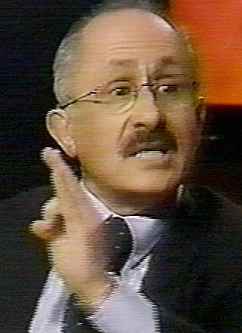
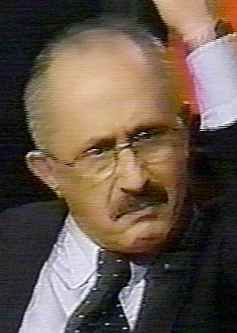
Truly, Akcam was ranting and raving so
uncontrollably, I began to think,
"The European polish which (he) had sedulously acquired dropped like a mask;
I now saw him for what he really was — a savage, bloodthirsty Turk."
(Of course, that passage is from "Ambassador Morgenthau's Story,"
describing Enver Pasha.)
My favorite shot had to be the one below, which I found strangely symbolic:
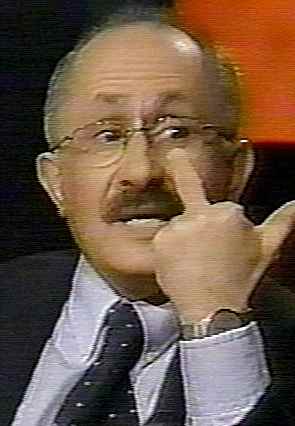
33. Were there government units involved in
massacres of Armenians, as Akcam blabbered out? While there is no real evidence,
such probably took place. (We know in one case government units certainly massacred
Armenian soldiers, for which a couple of the perpetrators were executed — by Vehip
Pasha — during the war, providing evidence against genocide; but
there is no evidence regarding Armenian civilians.) Do the isolated massacres locals
carried out, the ones we can only speculate about, constitute a state-sponsored
extermination plan? Not if we are also willing to concede that My Lai proved the
United States government planned to murder every single Vietnamese civilian.
Genocide is a highly serious charge, the greatest crime against humanity, and if the
accusers are not basing their conclusions upon genuine evidence, they are committing
a crime in their own right.
One thing is for sure: the 1919-20 Ottoman kangaroo courts held under enemy
occupation and performed with hardly any due process cannot constitute evidence. The
"confessions" that generals and governors might have made means nothing
when these men were the prisoners of the British, and the British and their Ottoman
lackeys were desperate to find culprits. It would be as though the Nazis had
defeated the British in WWII, set up a puppet government as the Nazis had done with
Vichy France, and established courts to try Churchill and Montgomery for war crimes.
No one would look upon these types of courts as legally valid, and certainly not
even the British took the 1919-20 Ottoman kangaroo courts seriously. The British
regarded these courts as such a travesty of justice that they rejected the courts'
findings, in the process of the Malta
Tribunal, the real "Nuremberg" of World War I. Read more about
the 1919-20 kangaroo courts.
34. Not only did the Balakian-Akcam team
get an extra turn with Simon's only "tough" question, but the team will
now be granted the last word.
35. "[T]he Armenians would prevent
scholars" Now there is a "Freudian" slip with the ring of truth.
(When we're talking about genuine scholars, of course.)
36. Wasn't that true, what McCarthy uttered
around Footnote 13: "...[S]omeone insists on attacking the personality of
the historian... because they don't have the facts." Look at Balakian here.
He doesn't have the facts. Indeed, what McCarthy told us was the truth, and nothing
but the truth. The Turkish government said to the Armenian government in mid-March
2005, let's get to the bottom of this madness in a "manly" way, and try to
put it behind us. (Prime Minister Erdogan added, "We do not want future
generations to have a difficult life because of hatred and resentment.") The
Armenian government would have none of it (are you kidding? The "genocide"
is the greatest racket the Armenians
have going.) Here is an Armenian source corroborating the story, the truth of which Balakian doesn't
like. After all, if the Armenians had nothing to hide, why wouldn't the Armenians
have jumped at the opportunity? So even though in this instance, Balakian was not
going after McCarthy's personality the way he shamefully had done earlier, his only
defense is, basically, "Liar, liar, pants on fire." He can't afford
to let the truth out. But because he doesn't have the facts, he just says, "what
Professor McCarthy has said is absolutely not true," and lets it go at
that. Since the brainwashed and biased public, represented by those as New York
Times reviewer Alessandra Stanley, is already in the Armenians' corner,
Balakian knows crying "Liar" will be enough in most cases.
ADDENDUM 7-06: Ironically, the very Reuters article
Balakian cited in order to discredit McCarthy wrote: "Armenia, a tiny ex-Soviet
republic which has no diplomatic relations with Turkey, has rejected Mr Erdogan's
proposal for an impartial investigation, saying scholars had already established the
genocide as indisputable fact." 9-06: To compound his lie, Balakian was
actually approached to comment on this very topic, in an April 18, 2005 Voice of
America article entitled, "Turkey Calls For a New Study of
Armenian Genocide Claims"; his weasel reply was that ample research has
already been done, and that greater worldwide recognition was due to "the fact
that scholars have done increasingly brilliant work over the last couple of decades,
writing objective, detached histories of the Armenian genocide.” Did you get that,
folks? "Objective and detached." Shameless, shameless man.
In addition: it is also interesting to note that McCarthy had made this proposition
four years prior to Erdogan's proposal; note the irony of some of his words,
particularly his last sentence, the truth of which Balakian was desperate to fudge: "I
suggest, as I have suggested before, that the Turkish Republic propose to the
Armenian Republic that a joint commission be established, its members selected by
scholarly academies in both countries. All archives should be opened to the
commission — not only the Ottoman Archives, but the archives of Armenia and of the
Armenian Revolutionary Federation. (The call is often made for the Turkish Archives
to be opened completely. It is time to demand that Armenians do likewise.) I have
been told that the Armenians will never agree to this, but how can anyone know
unless they try? In any case, refusal to fairly and honestly consider this question
would in itself be evidence that the accusations against Turks are political, not
scholarly."
37. Here we go again, with the poor,
innocent, Christian, unarmed population. Truly, how can this Balakian
character look at himself in the mirror? And I don't mean because he would need to
step far back, on account of his always-growing Peternocchio nose.
Genocide Guru Henry Morgenthau on the subject:
...it would seem as if an Armenian insurrection to help the Russians had broken
out at Van. Thus a former deputy here, one Pastormadjian who had
assisted our proposed railway concessions some years ago, is now supposed to be
fighting with the Turks with a legion of Armenian volunteers. These insurgents are
said to be in possession of a part of Van and to be conducting guerilla warfare in a
country where regular military operations are extremely difficult. To what extent
they are organised or what successes they have gained it is impossible for me to
say; their numbers have been variously estimated but none puts them at less than ten thousand and twenty-five thousand is probably closer to
the truth.
(National Archives and Records Administration [NARA], College Park, Maryland,
Morgenthau to the Secretary of State, 25 May 1915, RG 353 [Internal Affairs,
Turkey], Roll 41, p. 3. Footnoted from Dr. Edward J. Erickson's "Bayonets on
Musa Dagh: Ottoman Counterinsurgency Operations — 1915," The Journal of
Strategic Studies, Vol. 28, No. 3, 529-548, June 2005.)
Balakian tells us that his "Christian minority population"... we always
must be reminded that this was a "Christian" population, of course...
being "somehow in a capacity to kill people in an aggressive way that is
tantamount to war, civil war" points to the "realm of the
absurd." Yet, if one multiplies the thousands of Armenian fighters, culled
from the ranks of the traitorous Armenian population who refused to be conscripted n
the Ottoman army, added to the ranks of those who had deserted, times the many
Ottoman provinces (as Sivas, Erzurum, Adana, Diyarbakir, Bitlis, and Van) these
traitors formed a fifth column and hit the Ottoman Army in the back, you had better
believe they had declared war upon their own Ottoman nation; they posed a serious
threat to the beleaguered forces of the "Sick Man," in a fight for its
very life. The fact that this treacherous population was temporarily moved away,
instead of being heartlessly "deported" as the Russians were doing with
their entirely innocent Muslims, pointed to a "relatively humane"
process (as Prof. Guenter Lewy put it; Balakian did not like that) by the Ottomans. Do not forget
that most of the relocated Armenians had survived. The ones who died in greatest
numbers were the ones who remained in the war zone of eastern Anatolia.
The comparison to the Warsaw Ghetto was more applicable to the doomed Muslims under
the control of the Armenians briefly in charge of eastern Anatolia, with and without
the Russians. Since the little bit of "Armenian resistance" that
Balakian concedes here is justified because "People don't want to die as
sheep," take a look at the date of Morgenthau's report, above. May 25, days
before the resettlement policy was implemented. Since Balakian's
"genocide" hadn't even begun, what was happening in Van could hardly be
called "self-defense." It was the Armenians who were the attackers.
(As this mid-1915 newspaper
report from enemy France made crystal-clear.)
The better determinant of whether there was a real genocide is, since we have
established there were indeed many thousands of Armenian fighters behind Ottoman
lines, mostly involved in guerilla warfare, since the convoys (or what the genocide
industry would call "death marches") were so poorly guarded (sometimes
with as few as two guards; the guards themselves were pulled from the bottom of the
barrel, as the best men were needed at the many desperate fronts. These low-quality
gendarmes would have been a cinch to knock off), why didn't the Armenian fighters
attack the convoys? And rescue their women and children from certain death? This is
the critical question a U.S. senator asked,
while the USA was considering its mandate for Armenia, comparing with how the
American settler would have behaved in the same circumstances: "whoever heard of an American frontiersman
laying down his gun while the Indians slit his wife's throat and scalped his
children?")
Unless the Armenian men really didn't care about their women and children (we know
the leaders did not care about their own people in earlier times, encouraging
massacres so the West would intervene; so this is, unfortunately, a deplorable
possibility), how could they have not attacked the convoys? Especially since
the Armenians were armed and ready to
strike, for years? The only answer could be, the Armenians knew there
was no death sentence awaiting their women and children. The ones who were
murdered were attacked by renegade forces, but the Armenians knew the Ottoman
government did not have a "Final Solution" policy in place, the proof
for which in retrospect is that the majority of Armenians survived. (Balakian
himself says one million. The
pre-war population was some 1.5 million. Truly, if the idea was extermination,
closer to "zero" would have survived. There were still 644,900 Armenians in what was left of the
Ottoman Empire, in 1921, according to the Armenian Patriarch.) The only logical
conclusion is that the "genocide" was invented in later years, for
political purposes. After the war, the Armenians were not bawling about a
"genocide," but instead bragging
about their belligerence.
One Conclusion
This "debate" excruciatingly demonstrated that debate with
pro-Armenians is useless... unless the moderator is extremely conscientious,
knowledgeable and objective, unwilling to let anyone get away with falsehoods. For
lack of such a crackerjack moderator, we can see what the unscrupulous pro-Armenians
are capable of.
1) Ad hominem attacks, focusing on the messenger, instead of the message
2) Making any statement, regardless of the facts
3) When cornered and unable to cover the many holes of the genocide mythology,
simply stick out a tongue and yelp, "Liar, liar, pants on fire."
If you have been clicking back and forth on the footnotes, GO BACK to the end of the debate transcript and the analysis of
the host.
Thanks go to the kindness of Dr. F. Demirmen, and to his local PBS affiliate.
|
| |
Once again:
PBS: The Armenian Genocide
|
|